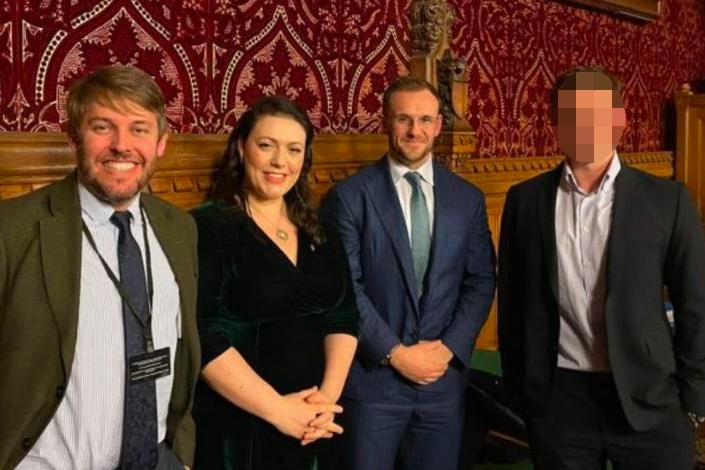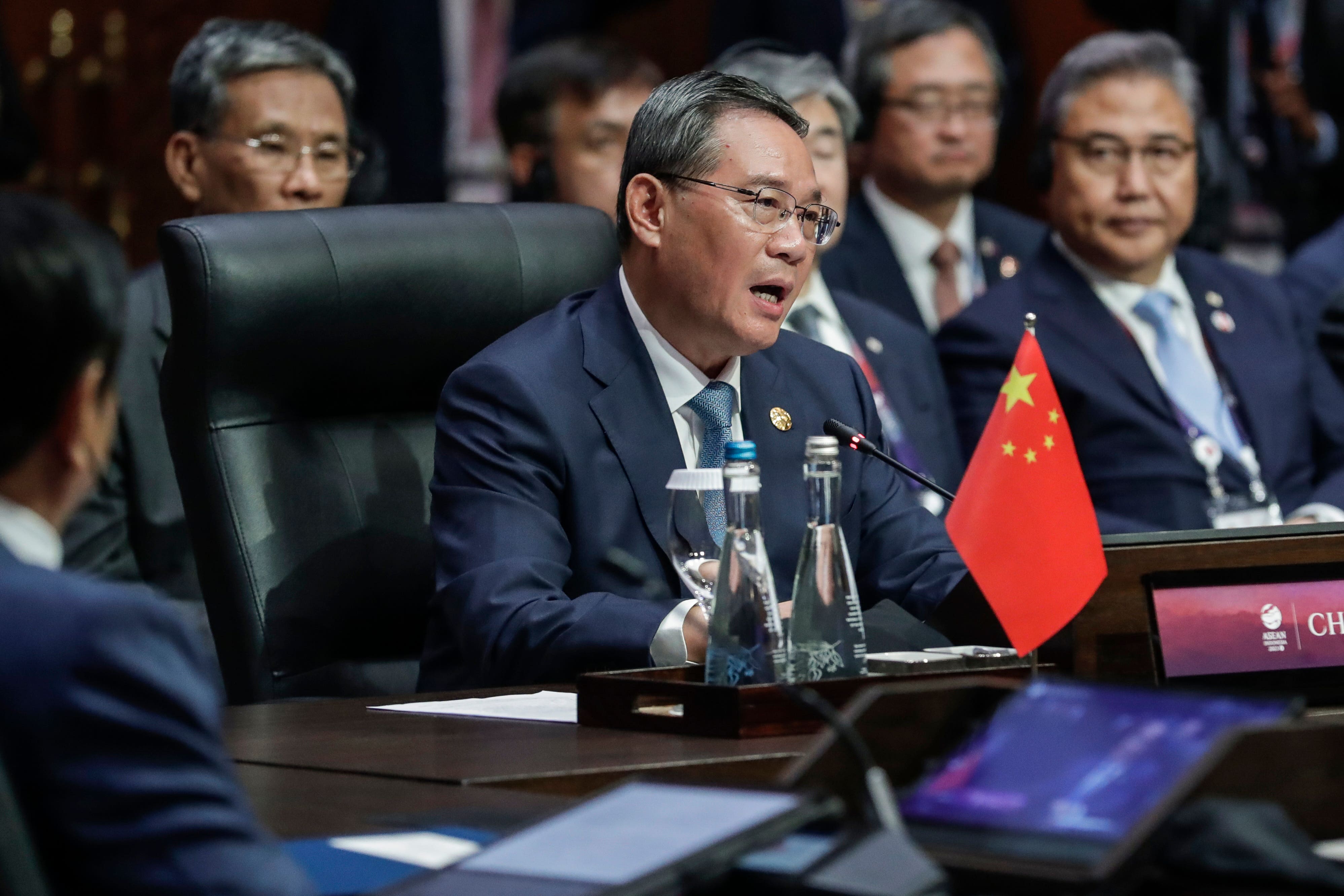I’m not a Chinese spy, insists parliamentary researcher arrested over espionage claims
Deputy PM Oliver Dowden described China as the ‘number one state-based threat’ after the arrest

Your support helps us to tell the story
From reproductive rights to climate change to Big Tech, The Independent is on the ground when the story is developing. Whether it's investigating the financials of Elon Musk's pro-Trump PAC or producing our latest documentary, 'The A Word', which shines a light on the American women fighting for reproductive rights, we know how important it is to parse out the facts from the messaging.
At such a critical moment in US history, we need reporters on the ground. Your donation allows us to keep sending journalists to speak to both sides of the story.
The Independent is trusted by Americans across the entire political spectrum. And unlike many other quality news outlets, we choose not to lock Americans out of our reporting and analysis with paywalls. We believe quality journalism should be available to everyone, paid for by those who can afford it.
Your support makes all the difference.A parliamentary researcher who was arrested on suspicion of spying for China has insisted he is “completely innocent”.
In a statement released through his lawyers, the man denied being a “Chinese spy” and said he had spent his career trying to “educate others” about the “threats presented by the Chinese Communist Party”.
The researcher, who had links with senior Tories including security minister Tom Tugendhat and foreign affairs committee chair Alicia Kearns, was arrested back in March – but this went undisclosed until Saturday.
The arrest, under the Official Secrets Act, led to Rishi Sunak confronting Chinese premier Li Qiang at the G20 summit in India on Sunday over what he alleged was “unacceptable” interference in democracy.
Mr Sunak told MPs on Monday night he had been “emphatically clear” in his engagement with China “that we will not accept any interference in our democracy and parliamentary system”.
“We will defend our democracy and our security,” Mr Sunak said.
He added: “I was emphatic with premier Li that actions which seek to undermine British democracy are completely unacceptable and will never be tolerated.”
It also led deputy prime minister Oliver Dowden to describe China as the “number one state-based threat” to the UK, an shift in Britain’s stance toward the country.
Ministers have previously described China as an “epoch defining challenge”, but stopped short of using the word “threat” to avoid an escalation of tensions between London and Beijing.
Individuals working for China may also be required to disclose their activities, Mr Dowden said, adding that there is a "strong case" to put the country in the "enhanced tier" of the foreign influence registration scheme.
Tory MPs sanctioned by Beijing have also expressed anger at not being told about the arrest. And after threats that a China-sceptic Conservative MP would use parliamentary privilege to name the suspected spy, commons speaker Sir Lindsay Hoyle warned that doing so would run “a serious risk of prejudicing any future prosecutions”.
The PM encouraged any MPs who fear they have been targeted by the suspected spy to report it to the police.
Downing Street said politicians with fears over their interactions with the individual should report them.
Asked if the prime minister would encourage MPs to go to the police, No 10 said: “If anyone had any concerns that they had been targeted in any way shape or form -and again I’m not pre judging this specific case - then yes of course.”
In a statement released by his lawyers, Birnberg Peirce, the man, who is in his twenties, said: “I feel forced to respond to the media accusations that I am a ‘Chinese spy’. It is wrong that I should be obliged to make any form of public comment on the misreporting that has taken place.
“However, given what has been reported, it is vital that it is known that I am completely innocent. I have spent my career to date trying to educate others about the challenge and threats presented by the Chinese Communist Party.
“To do what has been claimed against me in extravagant news reporting would be against everything I stand for.”
The former private schoolboy was arrested along with another man by officers on 13 March, on suspicion of spying for Beijing, it was revealed by the Sunday Times last week. Police said one of the men, in his 30s, was detained in Oxfordshire, while the other, in his 20s, was arrested in Edinburgh.
Both were held on suspicion of offences under section one of the Official Secrets Act 1911, which punishes offences that are said to be “prejudicial to the safety or interests of the state”.

The researcher, said to be the son of a GP and a sport star at his private school, had worked for a foreign affairs committee member and had worked in parliament for several years, but is believed to have previously worked in China.
He is reportedly a “skilled networker” rubbing shoulders with ministers, holding regular drinks events and using a dating app, including attempting to organise a date with a political journalist from The Sun.
It also emerged on Monday that the suspect appeared on the register of interests for MPs’ staff until April 28, more than a month after he was arrested.
The listing means the staffer may have had access to his parliamentary pass for weeks after the arrest. The House of Commons was asked to comment.
Addressing MPs on Monday, Mr Dowden promised the government “will do whatever it takes” to protect our national security. There is “constant vigilance” to root out interference from other governments,” he said.
China is the "number one state-based threat'' to the UK's economic security, he added, after coming under pressure to describe the country as a “threat”.
But furious Tory MPs – particularly those sanctioned by China – have hit out at security services for not disclosing the arrest, with Iain Duncan Smith claiming to The Times: “It’s a remarkably dangerous situation.
“This is a guy who allegedly spies on behalf of the Chinese government in the place where decisions are made and sensitive information is transferred.”
Another sanctioned MP told the paper they were “in a complete state of shock”, while a third said: “We didn’t know anything until we read it in the paper. I feel incredibly let down.”
But a source close to Kearns told The Independent: “Preposterous suggestions that Alicia should have breached all Police and Intelligence requests not to discuss this case could only come from individuals with zero understanding of legal investigations or intelligence work.”
As the row intensified, Downing Street refused to say whether any extra vetting was taking place within the civil service following the revelations nor whether checks had been strengthened after MI5 raised an alert last year warning that a suspected Chinese spy called Christine Lee had engaged in “political interference activities” on behalf of China’s ruling communist regime.
Sir Keir Starmer piled pressure on Mr Sunak to reveal what he knew when about the alleged spy.
Speaking during a visit to a school in Dagenham, east London, the Labour leader said: "The very big question now for the Prime Minister is was this raised when these arrests took place back in March or has it only been raised now that it's come into the public domain?
"I think that's the central question that needs to be answered by the Prime Minister today.”
No10 refused to say whether Mr Sunak’s confrontation with Chinese premier Li Qiang was the first time the government had raised the issue with Beijing.
Downing Street said details relating to a "live investigation" could not be shared, including when ministers were made aware of the case.
Sir Keir also declined to describe China as a threat to national security, saying “strategic challenge” is the right way to describe the country.
”But that does require that consistency of approach and that's what's been lacking,” he said.
The Telegraph said more security service interference alerts have been issued in recent months and said intelligence services were poised to unmask more Chinese spies in the coming months. The publication cited Whitehall sources who claimed suspected spies in the Commons face being detained under new espionage laws.
Additional reporting by PA



